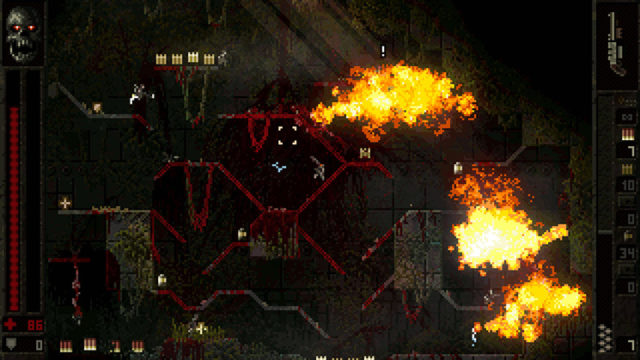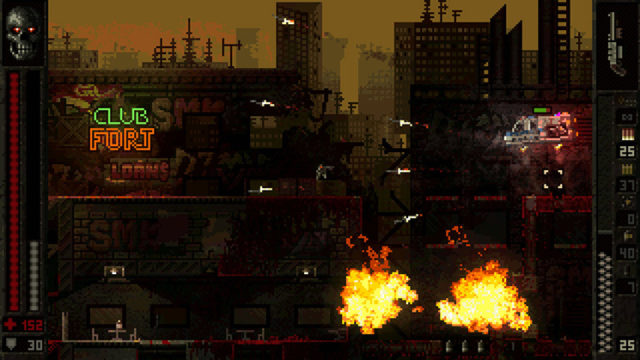Solid run and gun gameplay with some fun weapons; audio and visual design creates an atmosphere thick with gloom and violence; exceptionally rewarding for those looking for an intense challenge
Challenge occasionally borders on the realm of cheap; Very short, with little incentive to keep playing the game outside of getting better at it; bloody and dark atmosphere can be tiring and/or off-putting; no good introductory difficulty setting
While Switch’s library has expanded considerably since launch, some gamers might feel there isn’t quite enough gore to go around just yet. Butcher from Crunching Koalas looks to fix this apparent problem with an extreme focus on over-the-top brutality and challenging, retro-inspired gameplay. Unfortunately, aiming for such a specific experience can sometimes result in a game with rather limited appeal.
The story in Butcher is told less through narrative than it is through atmosphere. The adventure begins with a space ship flying through the atmosphere of a foreboding black and red planet to a derelict space station filled with hellish portals to enemy-filled locales just waiting to be splattered with blood. From start to finish, the game is dark and grimy with colors rarely drifting away from browns, greys and blacks. In fact, you don’t see anything even remotely colorful until the last set of stages. Thankfully, the levels are filled with a surprising amount of detail given the low-res sprites that define the game’s visuals. On a large TV, it can look a little muddy, but overall, it works exceptionally well. On the flip-side, this aesthetic focus might just come off as drab to some, because even though each set of levels has its own theme (volcano, jungle, etc.), they are all just really dark in the end.
The dark environments are made a little more colorful thanks to the sheer amount of blood you’ll be shedding. The gameplay in each level ultimately boils down to running and jumping to the end of each stage while murdering everything that moves along the way. Twin-stick mechanics are used for aiming and moving while the triggers are used for shooting and jumping. One nice feature Butcher introduces is a slight lock-on mechanic that focuses your aim on the nearest enemy in the direction you’re aiming, a feature that never makes things feel too easy while speeding up the process of slaughtering everything. Also, most enemies die rather quickly, regardless of which of the game’s six weapons you are using, though what enemies lack in toughness they make up for in numbers. This focus on speed is further emphasized by the brevity of the levels, which rarely take more than just two or three minutes to complete, assuming of course you don’t die repeatedly.

Chances are though, you will die repeatedly. Butcher doesn’t have a normal mode, instead opting for a laughably easy Casual difficulty before ramping up the challenge significantly with each ensuing difficulty level. On Casual, the game gives you loads of health, armor, and ammo pickups, but as you move to higher difficulty levels, the frequency with which they appear drop significantly. For the most part, this focus on challenge is well executed, as building up your reflexes and familiarity with the game result in impressive feats of badassery as you leap and blast your way through each stage. Unfortunately, things don’t always come together so well with the occasional inclusion of instant kill obstacles that seem to come out of nowhere and feel frustratingly cheap. These issues are compounded on several levels that feel overly long given the fact that death results in having to replay the stage from the start. It also doesn’t help that the final boss feels somewhat out of place, almost as though it was designed around gameplay mechanics that offer greater mobility than what’s offered in Butcher.
Another issue many gamers might have with Butcher is the fact that, outside of the difficulty, it doesn’t really offer that much to do. The game really wants you to spend time getting better and better as you move up in difficulty. Unfortunately, most gamers will likely find Casual mode too easy and Hard mode a frustrating place to get into the game. As proud as Butcher seems of its lack of a “normal” difficulty, it really would have made a lot of sense for introducing players to the game’s flow. While there are collectible skulls to find in each stage, the only thing do is unlock the hardest mode once all are located. Also, it is somewhat disappointing that you gain one weapon per area, and you don’t get the most interesting weapons until later, thus limiting the time you get to play with them. In other words, the only way you’ll likely get your money out of Butcher is if you really want to get better at Butcher, because getting through will likely only take two or three hours depending on difficulty.

Thankfully the sound design leaves little room for complaint. While everyone has their own musical preferences, it’s hard to deny Butcher’s soundtrack is anything but fitting, with a heavy industrial style. The sound effects are also fantastic, with each weapon creating a unique, impressive oomph with each pull of the trigger. The stylized soundscape is completed with the satisfying, gory sounds of evisceration as well as the constant wailing and groaning of your victims. Yes, it’s macabre and some might find it disturbing, but it all feels perfectly appropriate and well-done considering the game’s title.
From the moment you boot Butcher up, it’s clear that it is a thoroughly focused game, for better or for worse. As an action game, Butcher features solid mechanics, but its focus on difficulty could easily turn players off completely or limit them only to its less rewarding casual mode. The design aesthetic is similarly executed, presenting a violent and dark atmosphere that will entrance some, while repulsing others. The end result is a game that many gamers would likely be able to find some enjoyment in, but only a certain type of player will likely be able to look past it’s handful of faults, unapologetic difficulty, and esoteric aesthetic to fully enjoy it.




 ShareThis
ShareThis





